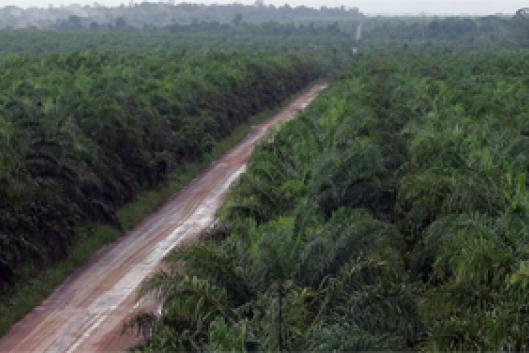Agropalma started its activities in 1982 and according to its website, has since grown to become “the main producer of palm oil in Latin America”. (1) Its oil palm plantations are located in the state of Pará in the Brazilian Eastern Amazon Region, with a refinery and mill in the port of Belém, the state capital. Agropalma is member of the “Palm Oil Innovation Group” (2), launched in June 2013 in Jakarta. The group, is a joint initiative of the NGOs Greenpeace, WWF, RAN and FPP, and Agropalma as well as other companies described by Agropalma on its website as “acknowledged leaders in socio-environmental innovations in this industry”.
Agropalma states that the initiative has been set up “[t]o intensify and improve the principles and criteria of the Roundtable of Sustainable Palm Oil (RSPO), which according to the participants of this group, could have been broadened during the last review in January 2013, especially where they relate to deforestation, carbon stocks, biodiversity and social relations.”
One of the criteria of the “Palm Oil Innovation Group” relates to labour rights and the companies’ performance on this issue (3). Social relations, as well as labour rights have indeed been a challenge for Agropalma. Workers on the plantations of farm owner Altino Coelho de Miranda, a supplier of oil palm fruit to Agropalma, have been found twice by inspectors of the Brazilian Ministry of Work and Employment, forced to work in conditions akin to slave labour.
During the first incident in 2007, 15 workers were released by the inspectors. Because of having committed the crime of employing workers in conditions akin to slavery, Miranda was sentenced to eight years in prison in 2009, but he appealed against the sentence. A final ruling has not been made yet on the case – a delay that is not unusual in the Brazilian court system. Meanwhile, Miranda was caught again for the same crime in 2012, when 10 workers were released by a government inspection team; again, people were encountered working and living in conditions akin to slave labour. Agropalma was challenged by the Brazilian NGO Reporter Brasil, an organisation that has played an important role in combating working conditions akin to slavery in Brazil. Reporter Brasil asked Agropalma why they had not cancelled the contract with Miranda after the first incident. Agroapalma responded, through its head of social and environmental responsibility, Tulio Dias. Dias explained at the time that the company had a 25-year contract with Miranda, and that although the contract included a clause that allowed for Agropalma to cancel the contract if infringements of labor legislation took place, the company preferred “pedagogical actions” that would encourage Miranda to improve their behaviour: “To cancel the contract would mean that we are running away from the problem, not solving it”. (4) However, by continuing to buy a product produced by workers living in conditions akin to slavery - a crime under Brazilian law - Agropalma also bears responsibility for this crime and the repeated grave human rights violation. Miranda had already been sentenced to no less than eight years imprisonment. Although Miranda used his right to appeal the court ruling, it is inconceivable how an RSPO member can consider “pedagogical action” as an appropriate response in such a context of grave human rights violations on the part of one of its suppliers.
Only as late as June 2013 did Agropalma issue a press release declaring “that it excluded from its list the provider Mr. Altino Coelho Miranda.” The press release explains that the cancellation of the contract is because of the fact that the producer has been included in the list of companies and people fined for employing people in conditions akin to slave labor, published by the Ministry of Labor and Employment on 28 June 2013. The press release notes that the producer is appealing the lawsuit on forcing people to work in conditions akin to slavery, but with the inclusion of the company in the dirty list, Agropalma felt that “nothing more can be done than excluding him [from the list of suppliers]. To take such a decision, Agropalma considered the Brazilian legislation, the code of internal conduct of the company and the principles and criteria of the Roundtable of Sustainable Palm Oil (RSPO), principle 6, criteria 6.5 and 6.12“ (5)
Apparently, neither the eight-year sentence of imprisonment the farmer received in 2009 nor the fact that 15 people had been found forced to work and live in in conditions akin to slavery conditions by state authorities in 2007 were considered sufficiently disturbing by Agropalma to justify cancellation of the contract with Miranda. Only the inclusion of Miranda in the official ”dirty” list of those subjecting people to working or living in conditions akin to slave labor in Brazil forced Agropalma to act and exclude Miranda from its list of providers. This “dirty” list is regularly published and updated by the government.
It is disturbing that a company participating in an initiative that claims to bring together ”acknowledged leaders in social and environmental innovations” considers it appropriate to maintain relations with a supplier that has been caught twice for subjecting workers to living in conditions akin to slavery. Only the supplier’s inclusion in the official ‘dirty’ list seems to have prompted Agropalma to opt for cancellation of the contract instead of ‘pedagogical actions’. Slave labor is a practice that even in this day and age persists throughout rural areas in Brazil.
For additional info on the social and environmental impacts of Agropalma’s operations, see “Impactos socioambientais da dendeicultura em comunidades tradicionais na Amazônia Paraense”, por João Santos Nahum e Cleison Bastos dos Santos, 2013. ACTA Geográfica, Boa Vista, Ed. Especial geografia agraria, p.63-80 e, and Reporterbrasil, “Expansão do dendê na Amazônia brasileira”, 2013, at http://reporterbrasil.org.br/documentos/Dende2013.pdf
(1) www.agropalma.com.br
(2) http://www.agropalma.com.br/palm-oil-innovation-group.asp
(3) http://www.agropalma.com.br/palm-oil-innovation-group.asp
(4) http://reporterbrasil.org.br/2012/12/denuncias-de-violencia-e-trabalho-escravo-envolvem-cultura-do
-dende-no-para
(5) http://reporterbrasil.org.br/2013/07/nota-da-agropalma/
